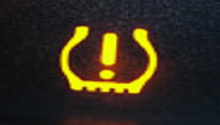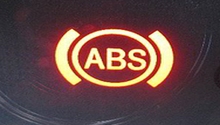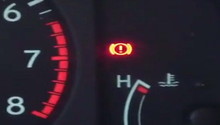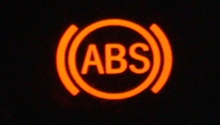Toyota 4Runner, Tundra, and Tacoma: Warning Lights
Warning lights provide vital information about the health of your Toyota 4Runner, Tacoma or Tundra.
This article applies to the Toyota 4Runner, Tundra, and Tacoma (1984-present).
The difference between a healthy car or truck and one that's on its way to 'clunking out' is a well-functioning, well-maintained and well-oiled internal system. If one or more major systems in your 4Runner, Tundra or Tacoma is in need of minor or major maintenance or repair, or simply needs to be replenished with oil or a professional-grade lubricant, a warning light will flash on the dashboard to alert you. Your owner's manual contains a complete breakdown of these warning lights and what they mean. Here are the most common.
Warning Lights
Battery and Brake
Some 4Runner owners have noticed that when their truck surpasses the 3,000 RPM mark, the battery charge and brake lights appear on the dashboard. Shifting, while simultaneously allowing the RPM to lower, could cause the lights to go away. In such cases, you are most likely looking at an easy and inexpensive fix involving your alternator (e.g., a wiring or bracket issue, water damage or corrosion) or battery (e.g., a bad charge).

Vehicle Stability Control (VSC) Trac
If this light pops onto your dashboard, you will want to avoid trying to resolve the issue on your own and head down to your local Toyota dealer for professional assistance. There could be a major issue with your anti-lock brake system (ABS) (e.g., an actuator) that requires extensive rewiring or professional expertise to fix, or a bad sensor that need replacing. In the best case scenario, your brake system will need to be re-calibrated.

Battery, Brake and Transmission Temperature
This is a clear indication that you should check your alternator (e.g., dirty brushes and loose connectors) immediately. Remove your battery first. This simple repair should only cost you about $50 or less.
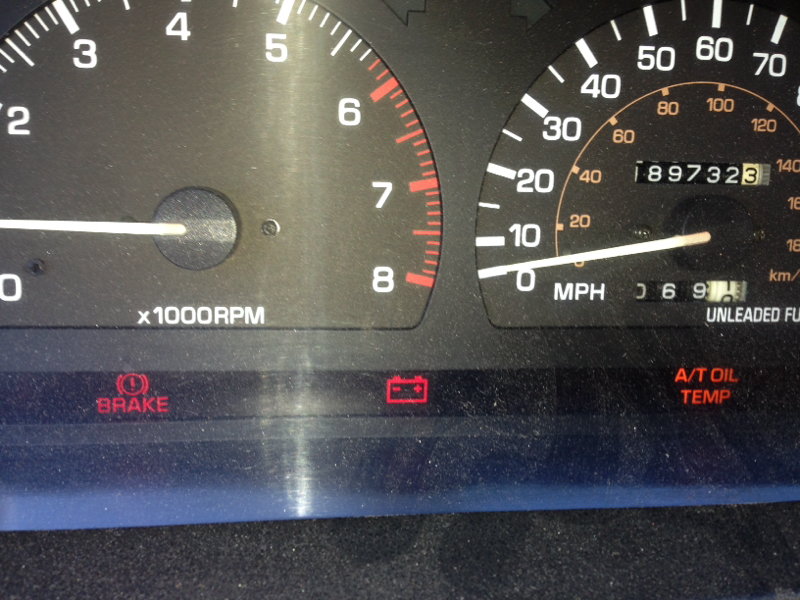
Common Questions
What is the most efficient way to check the health of my Toyota truck?
Have a professional mechanic check your major systems for trouble. To troubleshoot your truck on your own, you'll need to check your dashboard for warning lights and/or run your trouble codes using an OBD-II scan tool. Maintaining the fluids in your truck does not offer a trusted indication of your truck's overall health.
Why am I getting an intermittent brake light?
Your brake light fluid is most likely low. The switch in the lid of the master cylinder could also be faulty, or your brake pads and/or brake calipers could be worn down. Another culprit could be a faulty brake sensor. Have your entire brake system inspected.
How much fuel is present when the 'low fuel' warning light appears?
You should have 3 to 4 gallons of gas left.
Common Issues
Multiple Warning Lights at Once
After years behind the wheel or an especially long road trip, multiple warning lights could appear on your dashboard, such as your battery warning light, engine oil warning light, timing belt warning light, or fuel filter warning light. While the issue could be many things, it is likely your alternator has gone bad and is triggering a range of other warning lights. See a professional mechanic right away.
Engine Skips in Sync with Warning Lights
The likely culprit is a missing fuse connector; check the ignition circuit first, and then check the main power section. However, this could also very likely be an electrical issue, which your mechanic will need to repair. Your should be able to find and replace any faulty fuse connectors and gauges on your own.
Parking Brake Warning Light
Your brake fluid is most likely low. Check the fluid level in your reservoir before continuing to drive. Other possible causes include bad brake pads or a bad or finicky sensor (brake fluid).
Related Discussion
- Brake and Battery Charge Warning Lights - Yotatech.com


